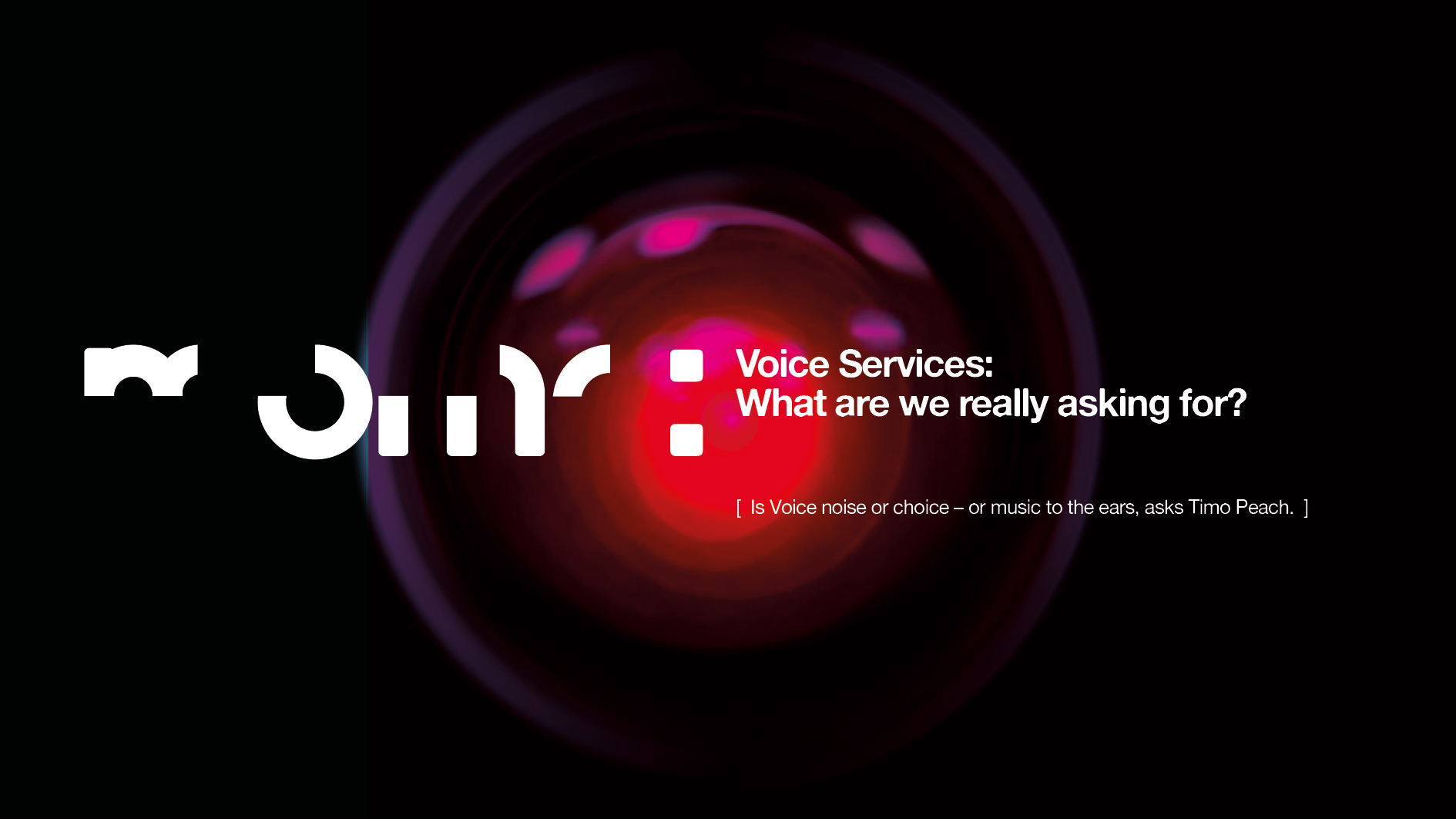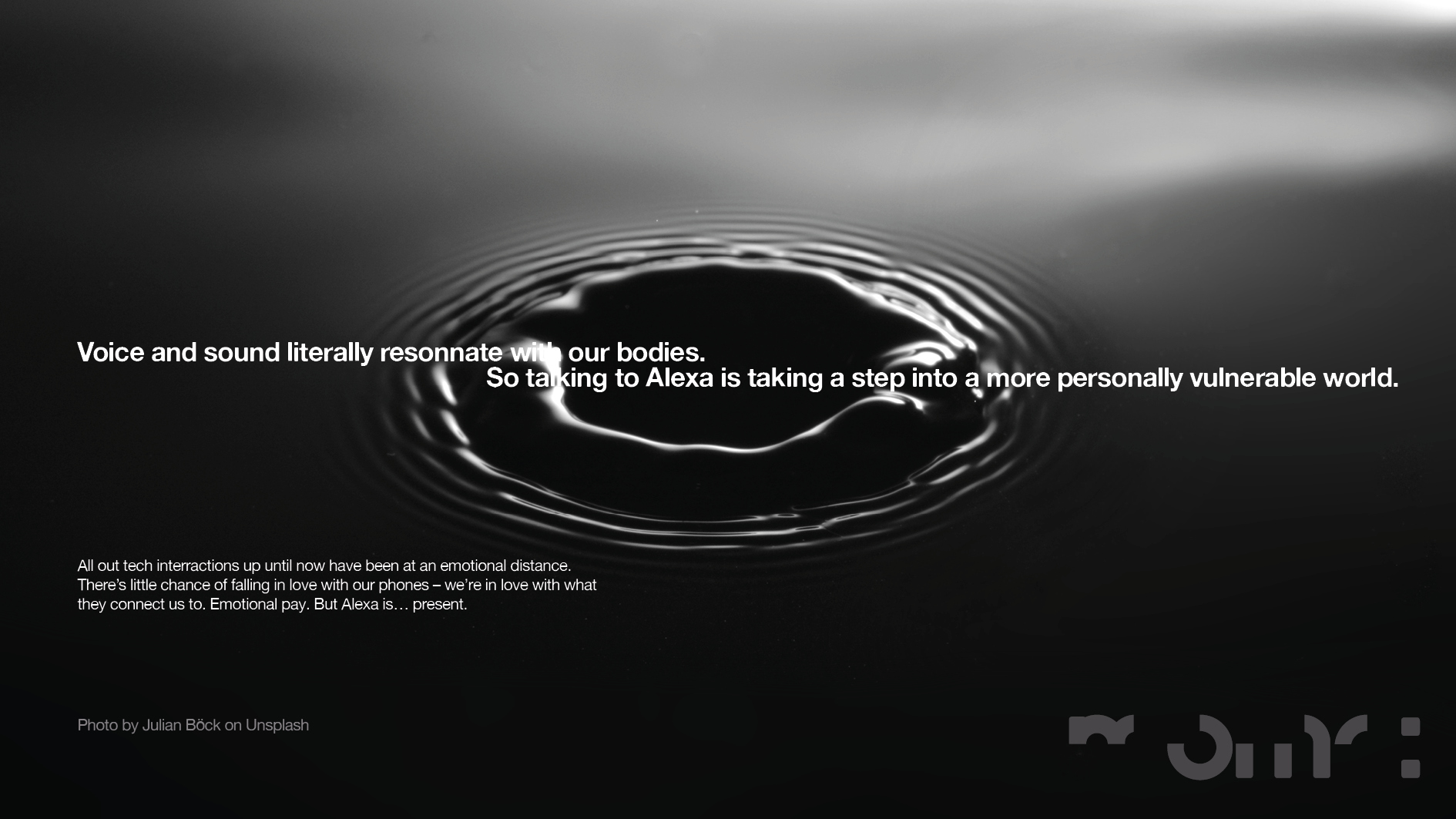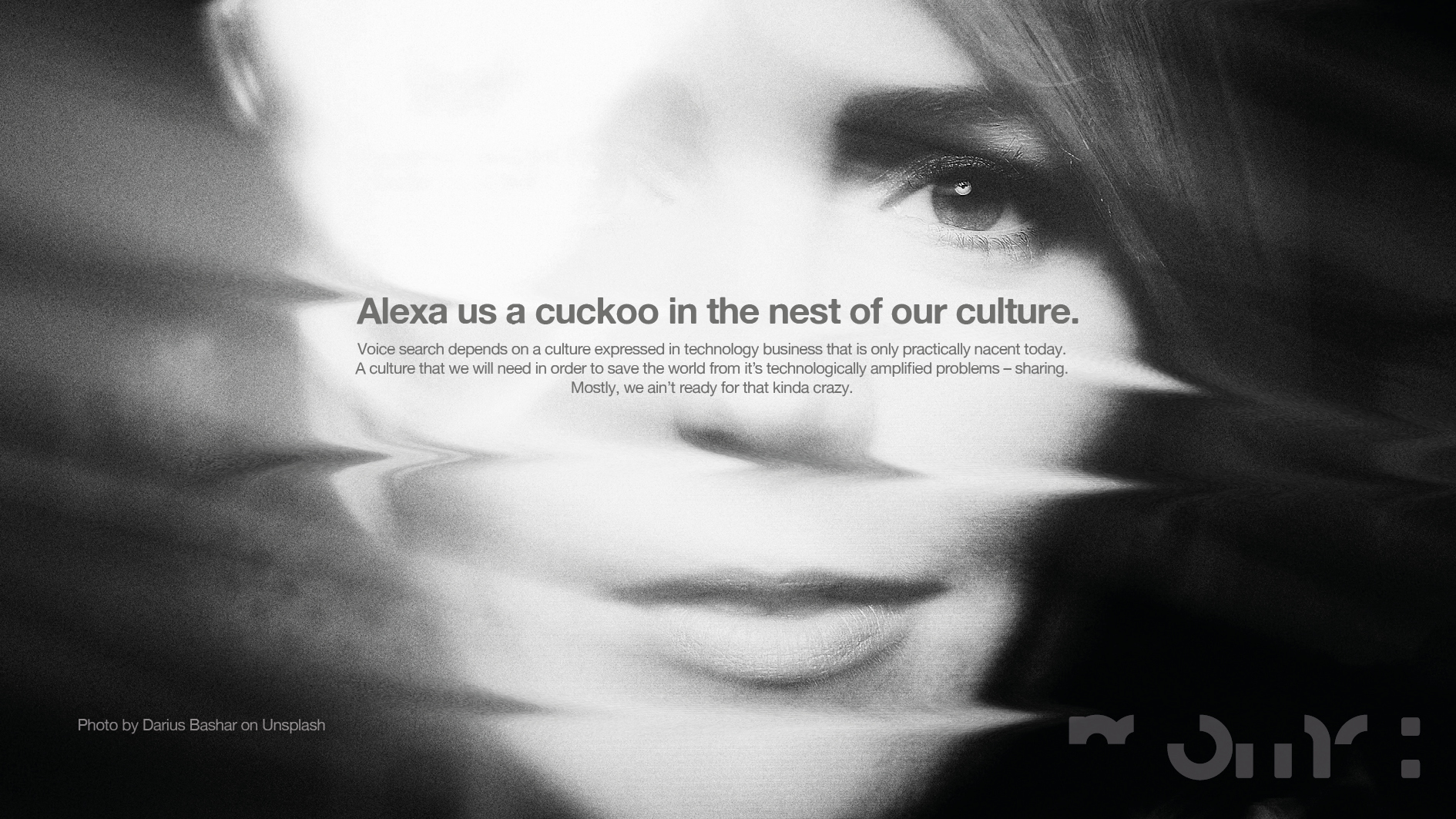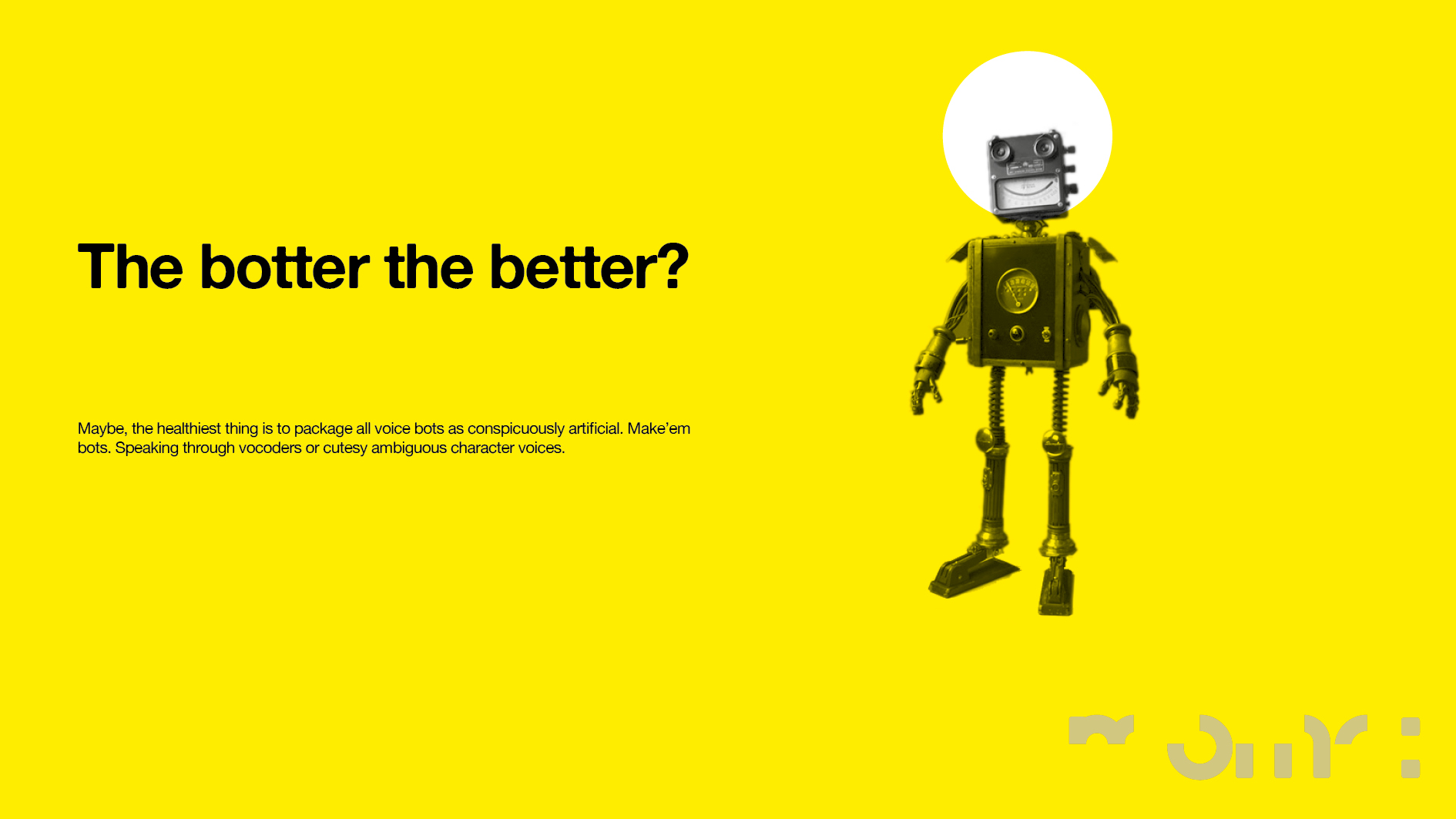Earlier in March, I was invited by Andy Headington of digital agency Adido to take part in their first ever 20:20 Digital Debate. A format designed to explore aspects of emerging tech and culture through the playful lens of a sort of debating society, with a case for and a case against a statement. So what did this house believe by the end of a very informed presentation by Nichola Stott of Erudite batting for the positives of the next big thing, Voice Services, and grumpy old man for the night, the bloke from Momo?
It was pretty unchanged. To cut to the chase. Just a little unnerved, after what I shared. But along the way, we had a jolly time considering whether the tech lovies are right to gush over the encroachment of Alexa into our homes, hailing it as the next big thing in connectivity, and a gateway to making a fully connected home more human.
As hopey-changey as I strive to be, making the futurism curmudgeon job a slightly weird fit for me, my scepticism about this in particular was founded quite instinctively. Then informed further by Ben Scott-Robinson of Small Robot, whose talk at VentureFest South the week before was so good I nicked a pertinent bit of content from it.
A top night, and an intriguing format I’d urge you to enjoy at the next event in the series. A huge thank you to Andy for the debates we’ve already been having about trends in the human-planet future, and handing me a mic for a spot with a warm invitation. And a pleasure to be on stage with Nichola, who basically actually knows stuff. In the questions afterwards, I’d generally answer with a lyrical bit of emotional-space guff and she would come back calmly with data and informed insight. Plus, she was funny.
For a taste of the evening, do watch the highlights film here, ahead of hopefully releasing the whole debate some time soon. And for your interest, below is the article behind my talk on the night, if you’d like to find out what I think we’re really asking for, when we ask Alexa anything.
I have a saying. One you’ve probably heard me say before. One I sometimes have the nerve to present “in quotes” to look more important in presentations. Because I believe that technology always finds its level. Now, new stuff is always exciting, of course. Exploring new stuff is playful – and this can be wonderful, helping to drive change and engagement with it. But technology is often sold as a panacea when in fact it’s always an R&Ded specific response to a particular problem and context, and as such always has it’s intended place. And that place is always, in the end, human.
In the progressy-sexy 20th century, there was a burgeoning of materials and uses of them that all signalled NEW AND COOL in their days. Vinyl and wood and paper and plastic – they have all, as I’ve said elsewhere, had falls from prominence in doing certain jobs, and all been pronounced to have had their day at some point or other. Yet all of these materials, y’know, surround us everywhere today and have found their secure roles in lives. We won’t likely ever see the back of any of their use in human life, because we’ve set the template of expectations. You might not imagine putting a record player in your car to attempt to use one on the motorway, but I’ll bet you really fancy a turntable at home now, don’t you? You trendy buffoon. Because the sheer theatre of opening a gatefold twelve-inch sleeve and and carefully sliding out a record and placing it onto a slip mat with the attentive care of a BBC4 documentary archivist is just… yummy. When you have the time.
So here’s the latest hip thing to make you look up from your record dust wiper. Blogging. Ever heard of it? All the kids are doing it.
It’s a good example of something hyped at first then left to clag boringly. It was a whizzy new thing – the Web Log. Then it went away but now it’s back. It went away because the hot hype of self publishing fizzled out when tossed in a sea of online journals that no one wanted to read. But today, the blog is seen as a fairly essential tool in the arsenal of 21st century marketing. Not because it’s new any more, not because it has any novelty now, but because it enables us to do something vital in human relationships, and therefore in business – give regular testimony to what we believe. It’s the simplest public way to become a regular, and so eventually trusted, source of championing something. So it’s kind of a big deal again today, not because of the tech but because of what it helps us do as humans.
The truth is, though, tech tends to actually flourish when it hasn’t simply found its level but found its place in combination with other emerging tech.
I’m not an early early adopter. Because I kind of think, why play at being homeless on Oxford Street overnight to queue to hand over a hefty rental deposit-sized amount of money on a glitchy first edition of something? I’d rather wait for a slightly more shaken-down iteration of whatever that too cool to want to keep warm thing is.
But something I said I was waiting for during the 90s was an omindevice. A pocket-sized something that could handily do all things I need on the move in one shape. And along came the the iPhone 3Gs – what became my own first proper smartphone. The advent of the omni-device as normal. And this new iteration of other stuff that had been around a little while did a bit more than convince us we didn’t want good photography any more, we wanted LOTS MORE photography, easily shareable. It also changed the shape of humanity. Because it transformed us into a truly networked creature.
It’s a revolution in human life on Earth we will spend our lives exploring.
The development of the internet was a revolution perhaps without equal. But it was a kind of grand opening act of the digital revolution, just when we thought we were mainly just getting compact discs and digital watches. What it did was set the stage of the real activation of potential.
When the other developments of touch screen technology and more powerful small processing and 3G rollout combined… that’s when human kind truly stepped into being a networked creature, because it liberated the internet from your dining room. Now you could take it for coffee. A step change that we are barely beginning to understand the consequences of, just ten or so years in.
The problem with the omnidevice, though, is that’s a practical compromise. It’s not excellent at anything – it’s sort of good at lots. So we’ve degraded our tech expectations and gone with convenience. Crappy video quality and petabites of crappy photos through boring lenses and text abbreviations of our rich parent languages are the normal currency for our daily lives as a result of it. But that omnidevice is still a step away from being personal. And it’s annoying.
Using thumbs to communicate is clunkily artifical. Voice, though… voice is personal. We are no longer just watching information in abstract observation, voice gets into your head.
There is just something about hearing. Sound. I’ve always said that radio is the best medium because it’s immediate and not consumed in silent abstraction like reading, but can go anywhere with you. TV and cinema demand suspended complete attention – immersion. And so does reading. Radio, though – radio is your friend, chatting over your shoulder while you’re chopping onions. While you’re driving. While you’re decorating. Painting pictures in your head like a book, but giving you a visceral experience like film. Because it’s making a much more emotional contact with your body than photons hitting the back of your eye from a screen.
Voice and sound literally ressonate with our bodies. So talking to Alexa is taking a step into a more personally vulnerable world. You may imagine you, or at least trendy millenials, love your/their phone. You may sleep with your phone, you may wrap your hands around it as lovingly as an old vintner’s grip carresses a wine bottle – but you don’t have conscious relationship with it, I’d argue. To such extent, we don’t realise how addicted to it we are, because we don’t actually see it – this thing we’re staring at all day. What we see is, of course, the mirror into ourselves. The smartphone has become a portal into our personal neuroses.
Voice, we hear. And so as creatures of imagination, storytelling and emotional connection, we cannot help but ask: Who is Alexa? This… this is a new level.
It’s a profound step into our future. But it won’t be a thing in itself. Because you quickly realise, Alexa is no one. Not just because what we now call AI is merely unconcious algorithms, but because she is meant to work with a suite of other devices.
We are still in an age where our homes are not connected hubs. For all the connectable devices in your life, you are not yet living the full Google voice ad, distinctly Black Mirror-looking, creepy all-connected fantasy. And this, I think, is partly because the tech firms themselves are a long way from this.
The IoT may be looming, but we still often have crappy WIFI and wouldn’t know what to do with a fridge that judges our cooking anyway. Our TV at home is a nice screen and a good picture but being ‘smart’ it’s reliant on apps to use its real benefits. Apps designed by telly companies like Panasonic, not software experts like Apple. Electronics manufacturers are trying to build software environments for their hardware, sure, but even if you as a tech giant spend a lot of money developing an ‘incubator’ to get in some of that stuff, it takes years to grow a true culture. To be marinaded in outlook and experience that truly crafts your work. And in corporate terms, how the heck do you line up all those different department head objectives? There’s a whole financial firewall mentality that blocks sharing and better development of cross-cultural technology, just within your average big corporate company. So how at ease are such entities with sharing between traditional competitors?
Alexa may be a cuckoo in the nest of our global culture. Because she will depend on a culture that is practically only nacent today – sharing. But it’s the fundamental shift in outlook that is needed to save the world from its technologically-amplified problems.
I learned ages ago as a music producer that there is no point in spending time trying to learn how to play the drums or the trumpet badly to get the result I want in a song – why blow myself? When I can get in a trumpeter or a drummer to do it much better and quicker. And significantly more than that. Because getting in a trumpeter or drummer means I’m also getting in a different perspective on the music. I can learn from them and maybe get even better results than I imagined. Or certainly waste a lot of time pleasantly yakking about early Chaka Khan records. Much more fun, much better results.
Like the tech of the 80s, we dream of future ways of living that we can’t actually enjoy yet, because the tech isn’t quite there. But Alexa will find her place when my Tado thermostat connects easily to my sound system connects to my TV connects to my lighting grid connects to my electric car charger connects to my PVmicrogen connects to my house battery connects to the outside world… in a breaking down of corporate separate languages into shared experiences. I don’t want an all-Apple house. I did. But it, well, kinda creeps me now. And annoys. I want to choose the best device for the job from who’s ever made it, and slot it into the web of my life at home without blood-vessel-popping pairing problems. It would be nice though if, when any of us bought a new telly, we didn’t soon imagine we’d have to go out and buy another separate box requiring connecting leads to give us a better experience on screen, eh.
We want ease. We want connection. But we also want choice about how we interact with the world around us. I don’t believe we actually want choice to the dizzying, time-sloshing degree that retailers, politicians and swiping apps imagine we do. I think this is zombifying and stressful all at the same time. But we do have different preferences about how we interact with information and different ways of learning. What we want really is the right tool for the job – the right tool for us, in any given situation. The tool that makes it easy, whatever it is, is the tool you keep. Sometimes that’s an omnidevice – the most used tool in my house is a Gerba multitool randomly give to me by my mate Julian for a birthday present many years ago. Discovered only in the last week that my mate Andy swears by the exact same tool on film shoots. It fixes much – but there’s no substitute for a good screwdriver when trying to get a picture hook on the wall. Or an electric drill.
Alexa is a significant new bit of tech thing on her own. Especially if you have sight issues – Alexa opens up the world potentially. And any new tech can help you see the world differently – strap on its goggles and see how things look. But the real potential of Voice is as a useful additional touch point into the web of tomorrow, which we can sort of just begin to explore and play with today.
Plug Alexa into AR, when that’s a more deliverable thing, and wow. Plug it into other bits of wearable technology and it’ll be helpful. It will be more a natural way to interact with technology to do what we want to do.
What we’ll have to do is what we always do with new technology – relearn our boundaries. From the digital market place to falling for AIs.
But you’ll have to have one thing if you want her. A relationship. Because she will have to have access to every aspect of your digital life, and how it directly affects your material and emotional life. Do you trust her?
Of course you do, because she is you. She just mirrors what you want. But is this healthy?
Let’s face it, search assistants are weird out of the box. They come packaged as ‘male’ or ‘female’? This can be problematic. Why should a bot be ‘she’ or ‘he’? And what does it say about the manufacturer preloading that decision? Well, if you think it might be wiser to let the consumer ‘choose’ the sex of their new baby – sorry! – their new slave, is that good for us to ‘play’ God? For twerps like you and me to get used to manipulating the presences around us to our preferences? Philosophy club discuss.
Maybe, the healthiest thing is to package all voice bots as conspicuously artificial. Make’em bots. Speaking through vocoders or cutesy ambiguous character voices. Much more Jap-toy tech. Either way, our anthropromorphising of this lifeless information connecting device will delude us as to its full programmed possibilities. It’s automatic intentions. For, in order to work, Alexa has to be always listening.
Does information only flow out of Alexa’s speaker? Or does it flow the other way too, through its microphone? Constantly. All around your house.
Think. About. That for a while.



